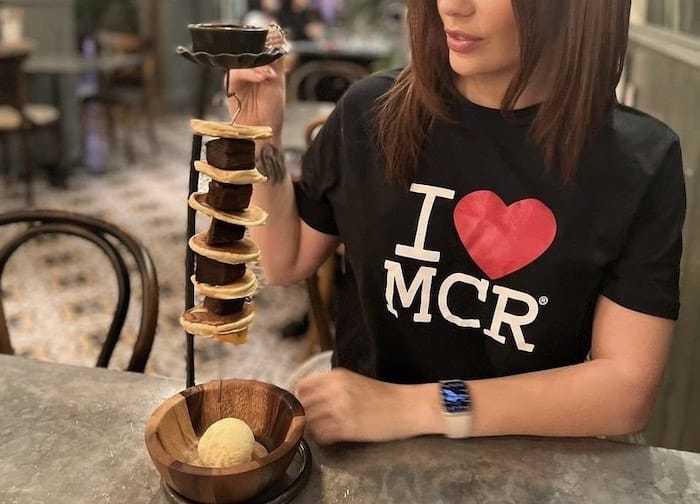Review: Flock at the Lowry is ‘a powerful drama exploring growing up in the care system’
- Written by Ilaria Pignalosa
- Last updated 4 months ago
- City of Manchester, Theatre

Directed by Jim Pope and written by Lin Coghlan, Flock is the story of Robbie (Jamie Ankrah) and Cel (Gabriella Leonardi), two siblings who have been navigating the care system their entire lives and are now dealing with the struggles of early adulthood.
The show explores the instability experienced by young people growing up in care, the devastation of being split up from siblings, and the strength of the bonds that hold families together.
Flock at the Lowry
Robbie and Cel’s stories are woven together with two other characters, also fighting their own inner battles: Mrs Bosley (Jennifer Dalay), the social worker following Robbie’s case and dealing with a messy and painful divorce, and Miko (Deshaye Gayle), Robbie’s best friend who is taking care of his very ill dad.
While Robbie and Cel are the core of the play, we also get to know more about Mrs Bosley and Miko’s stories. However, due to the brevity of the narrative (about 75 minutes), one can’t help but feel that we never have enough time to fully understand or connect with them.
Though tackling issues the audience can easily relate to or at least try to bond with, there is a lack of character development. For example, we never fully understand Miko’s home situation.
At the very end, Mrs Bosley explains that her husband has ended their marriage after 25 years, and she is so devastated that she needs to take time off work. However, we simply do not have enough time or context to see how she is dealing with this (aside from a very brief scene where she is seen buying a meal for one at Tesco).
As a result, all characters are relegated to more of an archetype (the kind social worker, the sometimes overprotective younger brother, the older sister who had to grow up too soon and parent her little brother) rather than being fully realised individuals.
A simple set design
The four characters move and interact on a simple set (designed by Sandra Falase) that relies on very few elements. In some cases, this disrupts the flow and rhythm of the narrative.
For example, at the very beginning, we see two characters dragging a large sheet of white tarpaulin across the stage, creating a sudden and unwanted distraction at a crucial moment, while we are still getting to know Robbie and Miko and hearing about their stories.
It took three years of working with the engagement program Rising the Roof for writer Lin Coghlan and director Jim Pope to finally complete the script and the idea for Flock. During that time, they worked with young people who had been through the care system and partnered with organisations in the criminal justice, mental health, and care sectors to use theatre-making to help people tell their stories from their own point of view.
The idea behind Flock is to represent the resilience of young people in the care system, giving them the tools and the space they need to finally tell their truth.
Interestingly, the play does not use a “verbatim” script, and there is never a single main character. Raising The Roof participants attended rehearsed readings throughout the writing process, offering feedback and using their personal experiences as inspiration.
The horrors of the care system
Flock is undoubtedly a strong and loud effort to shed light on the struggles (and sometimes the horrors) of the care system, seen from the point of view of those who have experienced it from an early age. However, the play seems extremely cautious about making any profound and explicit observations, leaving it up to the audience, who may not have enough context to understand the full picture.
Mrs Bosley is often seen giving Robbie and Miko money to help them buy sweets or vapes—commodities they can’t afford with the little money they get from the government to cover shopping.
However, we never really see them struggling to cover their basic necessities. In moments of rage, Robbie accuses Mrs Bosley of lying to him instead of helping him find a place of his own for him and his sister when he turns 18—but we never know whether this is true, highlighting some kind of corruption within the system.
While it struggles to share a powerful and poignant message, Flock is still an interesting play that can appeal to a younger audience or at least provide basic tools for anyone trying to understand how hard it is to grow up without family support.
There is very little hope in how the story ends, but all the actors still do an excellent job conveying the importance of creating your own family and helping each other build a better future together.
You can find out more about Flock by clicking here
- This article was last updated 4 months ago.
- It was first published on 15 November 2024 and is subject to be updated from time to time. Please refresh or return to see the latest version.
Did we miss something? Let us know: [email protected]
Want to be the first to receive all the latest news stories, what’s on and events from the heart of Manchester? Sign up here.
Manchester is a successful city, but many people suffer. I Love Manchester helps raise awareness and funds to help improve the lives and prospects of people across Greater Manchester – and we can’t do it without your help. So please support us with what you can so we can continue to spread the love. Thank you in advance!
An email you’ll love. Subscribe to our newsletter to get the latest news stories delivered direct to your inbox.
Got a story worth sharing?
What’s the story? We are all ears when it comes to positive news and inspiring stories. You can send story ideas to [email protected]
While we can’t guarantee to publish everything, we will always consider any enquiry or idea that promotes:
- Independent new openings
- Human interest
- Not-for-profit organisations
- Community Interest Companies (CiCs) and projects
- Charities and charitable initiatives
- Affordability and offers saving people over 20%
For anything else, don’t hesitate to get in touch with us about advertorials (from £350+VAT) and advertising opportunities: [email protected]

Lowry’s most iconic painting becomes a thrilling immersive experience

Five’s first full reunion in 25 years hits Manchester this Autumn



















